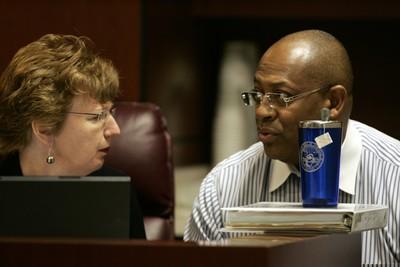Bills facing extinction if they
CARSON CITY -- Lawmakers who open the 12th week of the 2007 Nevada Legislature on Monday face another big deadline, a requirement for all Assembly bills to cross over to the Senate and for all Senate bills to move to the Assembly.
When the legislators conclude their floor sessions on Tuesday, most of the measures that haven't made those moves will be dead. Exceptions include proposals that are in Senate or Assembly money committees or that can survive in the form of amendments to bills that are still alive.
Monday's hearings include an Assembly Ways and Means Committee session on nine bills, including AB246. It adds 12 new judgeships in the Las Vegas and Reno areas at a cost to local governments of at least $32 million.
Also on the agenda is AB582, which revises the manner in which fees are charged for driver's licenses or state identification cards.
The Senate Judiciary Committee holds another hearing on AJR5, which would add a lottery to the forms of gambling allowed in Nevada. The state's cut of lottery proceeds would be used to buy school computers and textbooks.
The Assembly Natural Resources, Agriculture and Mining Committee considers SB118, which would require the state Environmental Commission to adopt rules for handling and storing mercury only when the mercury amounts to 100 tons or more.
The Assembly Education Committee considers SB284, which would allow Clark County middle schools to charge fees and accept donations to pay for sports programs. One-third of donated money would go to poorer schools that were unable to raise funds.
On Tuesday, Assembly-Senate budget subcommittees plan to wrap up work on spending plans proposed by various state agencies, including Taxation, Information Technology, Agriculture and Business-Industry departments.
The Senate Judiciary Committee considers AB102, which restricts eminent domain powers. It's a companion measure to AJR3, a proposed constitutional amendment that also limits eminent domain. The bill would take effect as early as October, while the constitutional change must pass the next legislative session and then go to a vote of the people.
On Wednesday, the Senate Finance Committee considers eight bills, including SB423 which provides funding for a performance audit of the electronic voting system used in Nevada.
The Assembly Judiciary Committee debates SB31, which would let the state's elder abuse investigators get criminal histories of suspects from police agencies. The panel also considers SB155, which toughens penalties for identity theft.
The Assembly Ways and Means Committee discusses AB374, a plan for four entry ports on main Nevada highways, where high-tech equipment could scan up to 20,000 trucks a day to see if they're being used to smuggle drugs, people or explosives that could be used by terrorists.
The Senate Judiciary Committee reviews AB8, which requires people arrested for a DUI to stay in jail until their blood-alcohol level drops or, if they took drugs, for 12 hours. Also being considered is AB4, a good Samaritan measure which protects from liability a doctor or nurse who helps a pregnant woman in labor or delivery in an emergency.
On Thursday, the state Corrections Department budget is among various spending plans up for reviews in Senate-Assembly budget subcommittees.
The Senate Judiciary Committee considers AB72, which would make it easier to prosecute Internet predators who lure someone they think is a child but instead turns out to be a police investigator.
On Friday, the Assembly Judiciary Committee debates SB14, which targets "smoker's corners" near schools by banning the possession or use of tobacco products by anyone under age 18.
The committee also will discuss SB174, which would prevent doctors' apologies to their patients or patients' families from being admitted as court evidence if they're sued for negligence later.
The Senate Judiciary Committee reviews AB127, which would allow people to record telephone calls from collection agencies without their consent.






















